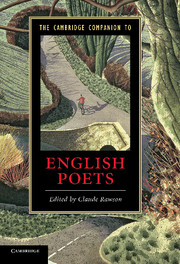Book contents
- Frontmatter
- Introduction
- 1 Geoffrey Chaucer
- 2 Thomas Wyatt
- 3 Edmund Spenser
- 4 William Shakespeare
- 5 John Donne
- 6 Ben Jonson
- 7 George Herbert
- 8 John Milton
- 9 Andrew Marvell
- 10 John Dryden
- 11 Jonathan Swift
- 12 Alexander Pope
- 13 William Blake
- 14 Robert Burns
- 15 William Wordsworth
- 16 Samuel Taylor Coleridge
- 17 George Gordon, Lord Byron
- 18 Percy Bysshe Shelley
- 19 John Keats
- 20 Alfred Lord Tennyson
- 21 Robert Browning
- 22 Emily Brontë
- 23 Christina Rossetti
- 24 Thomas Hardy
- 25 William Butler Yeats
- 26 D. H. Lawrence
- 27 T. S. Eliot
- 28 W. H. Auden
- 29 Philip Larkin
- Further Reading
- Index
14 - Robert Burns
Published online by Cambridge University Press: 28 May 2011
- Frontmatter
- Introduction
- 1 Geoffrey Chaucer
- 2 Thomas Wyatt
- 3 Edmund Spenser
- 4 William Shakespeare
- 5 John Donne
- 6 Ben Jonson
- 7 George Herbert
- 8 John Milton
- 9 Andrew Marvell
- 10 John Dryden
- 11 Jonathan Swift
- 12 Alexander Pope
- 13 William Blake
- 14 Robert Burns
- 15 William Wordsworth
- 16 Samuel Taylor Coleridge
- 17 George Gordon, Lord Byron
- 18 Percy Bysshe Shelley
- 19 John Keats
- 20 Alfred Lord Tennyson
- 21 Robert Browning
- 22 Emily Brontë
- 23 Christina Rossetti
- 24 Thomas Hardy
- 25 William Butler Yeats
- 26 D. H. Lawrence
- 27 T. S. Eliot
- 28 W. H. Auden
- 29 Philip Larkin
- Further Reading
- Index
Summary
Robert Burns came to fame during the decade that fell between the American and the French Revolutions, and his fame was itself in some ways revolutionary. He was a man from the poor who became a national poet and a patriotic icon. He was an early inhabitant of what could be known to his immediate posterity as an age of personality – a morning star. But his stardom did not save him from remaining precariously poor, and he did little to court material reward. Those who stepped into the Lowland cottages of the last century could find themselves standing before a sepia engraving of the poet, perhaps in Masonic dress, displayed in the manner that portraits of popes, leaders, and founding fathers were displayed elsewhere in the world. But these man-of-feeling, thriving-farmer images were unlikely to suggest the polemically democratic Burns who has been affirmed but also neglected in his native land, who has been both taken and left as an aspect of the Burns ‘revolution’. Within living memory he could be referred to in Lowland cottages as ‘Rabbie’. Rabbie spoke up for honest poverty but was not usually accounted a subversive.
He was born on 25 January 1759, fifty years after the parliamentary union of Scotland and England, a bond recently relaxed. Scotland kept its established Presbyterian church and its legal system, which meant that the political life of which the young Burns grew conscious encompassed the debates of Edinburgh’s ministers and lawyers in the General Assembly of the Church of Scotland, and the odium theologicum of the parish and the synod.
- Type
- Chapter
- Information
- The Cambridge Companion to English Poets , pp. 271 - 290Publisher: Cambridge University PressPrint publication year: 2011

